
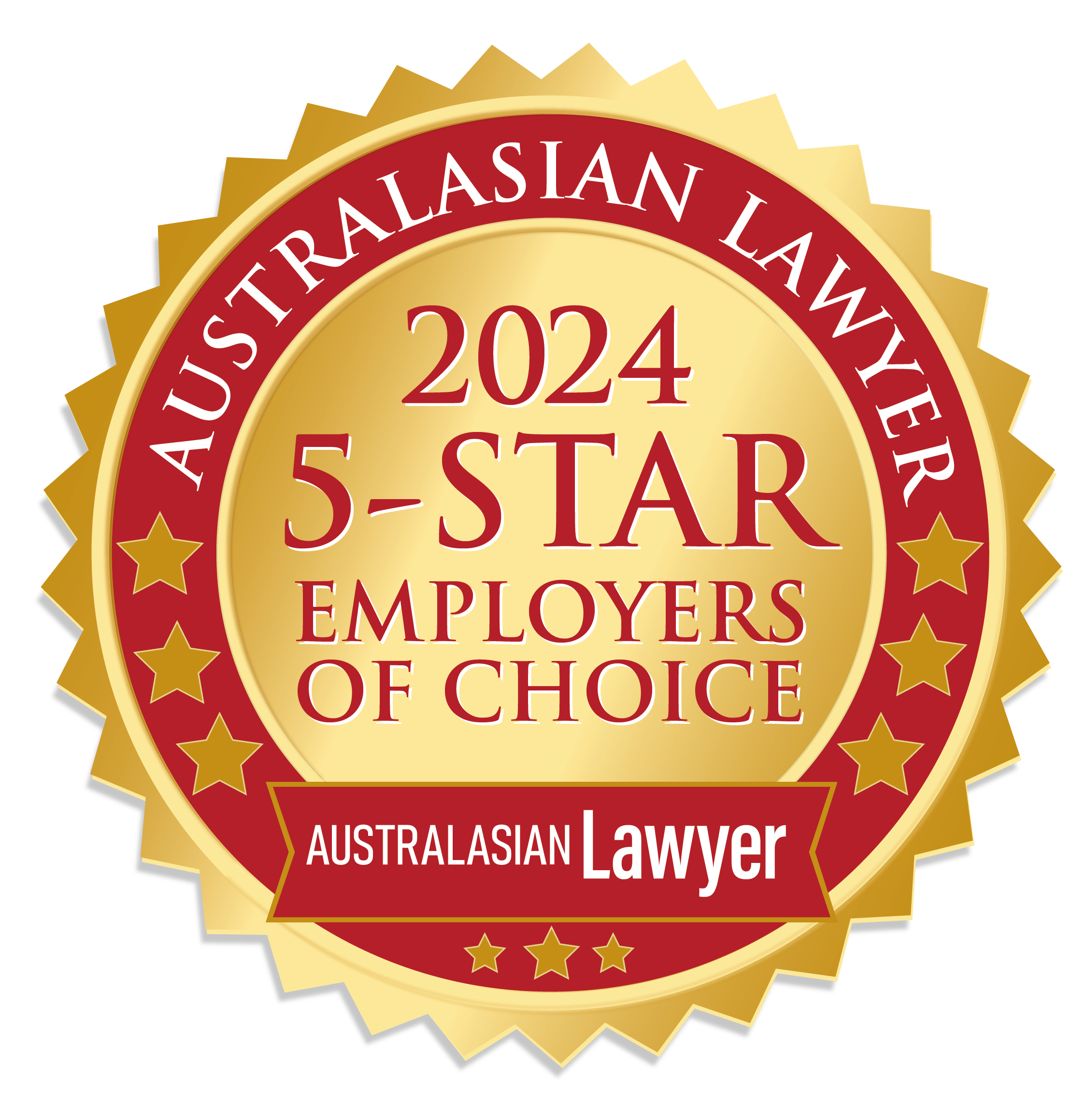
Jump to winners | Jump to methodology
Attracting and retaining top talent is the single biggest focus for the Australian legal sector.
That’s according to recent data, which shows that as a more pressing priority over the next 12 months, ahead of cyber security and transforming the client service delivery model.
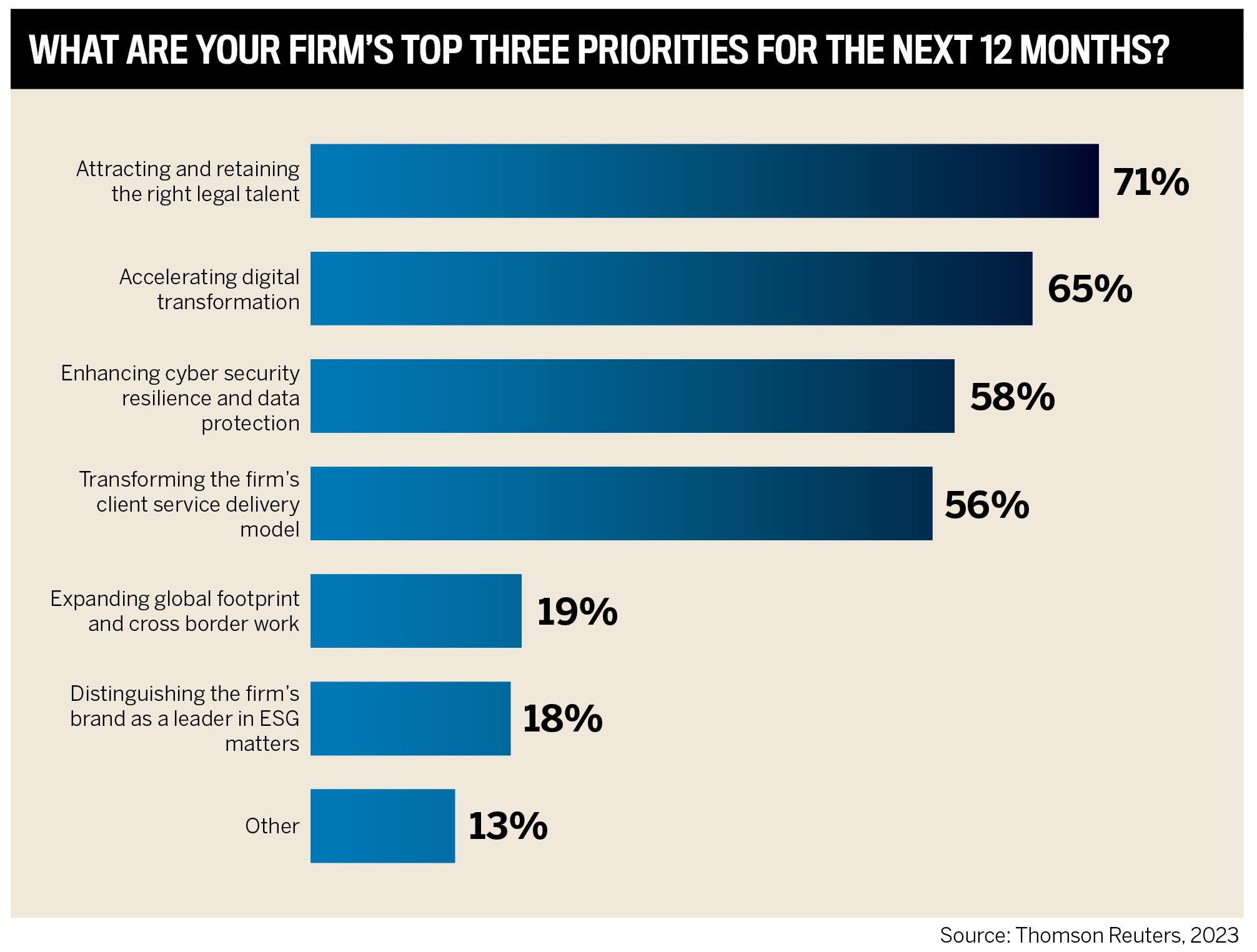
That is why Australasian Lawyer’s 5-Star Employers of Choice 2024, performance-leading workplaces supporting the advancement of their employees, are at the forefront of the industry and on the leading edge of attracting and retaining talent.
Following nationwide nominations, AL’s research team thoroughly reviewed the entries, which consisted of both quantitative and qualitative information, to determine the best law firms to work for in Australia.
The key factors highlighted by positive employee experiences included:
leadership
remuneration
professional development
work-life balance
Firms then listed initiatives and programs implemented, along with their achievements in key areas, to determine their performance as leading workplaces.
Industry experts stress that providing autonomy to employees is important, but employers should also ensure their teams feel supported.
“Given the fast-paced nature of the legal environment, employees can easily feel overwhelmed and undersupported,” says Robert Kruger, senior manager – legal at Robert Walters Australia. “Employers should strike a balance where employees have the freedom to work independently without feeling micromanaged while also providing a supportive environment. Achieving this delicate balance is challenging, but leading employers should make it a priority to establish such a culture.”
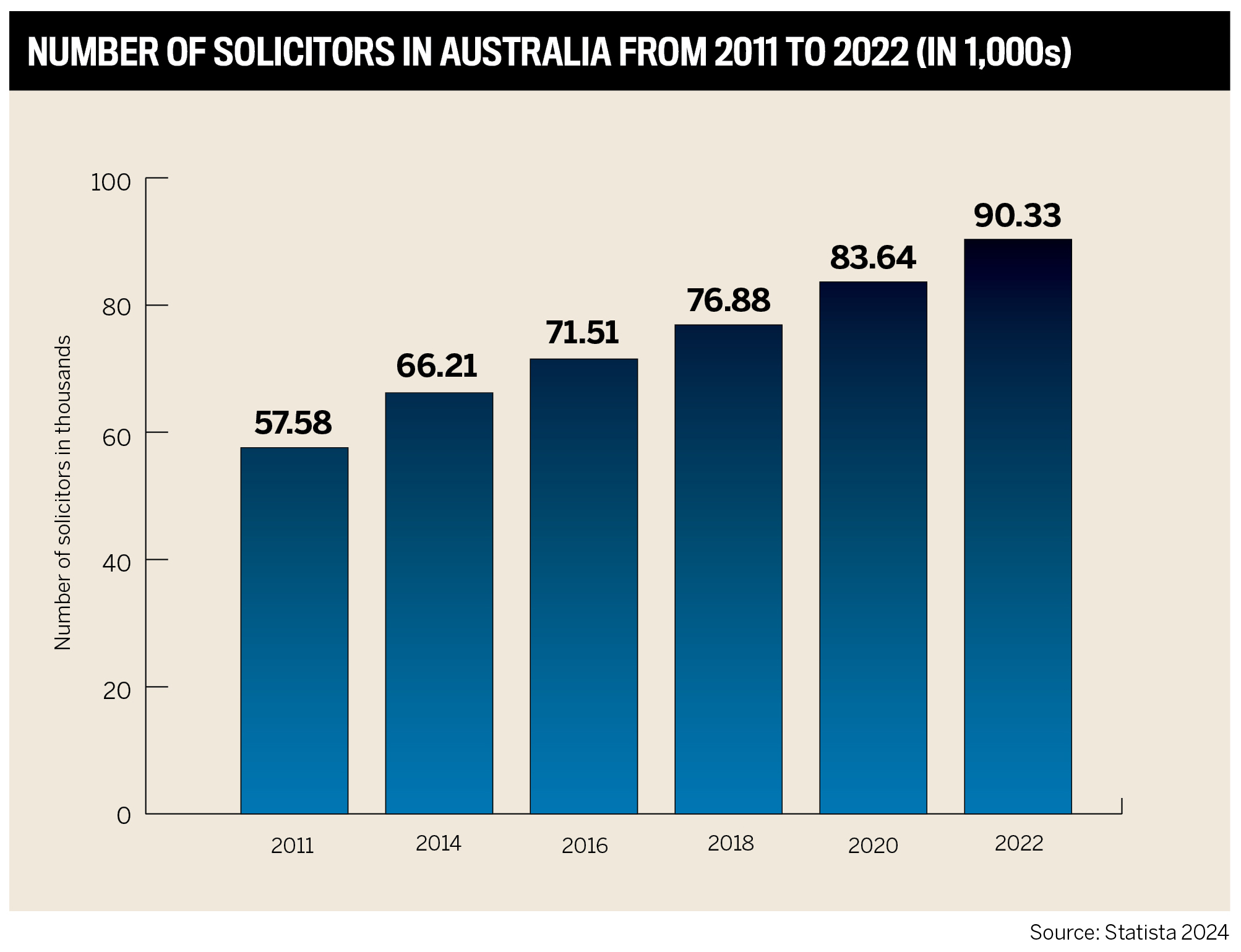
The need to meet these standards is steadily becoming more crucial as the Australian legal sector is growing and there is greater competition for the best people.
In 2022, there were 90,329 solicitors nationally, 32,752 more than in 2011.
The largest proportion of solicitors were registered in:
NSW: 42%
Vic: 25%
Qld: 16%
The areas with the largest growth rates in the number of solicitors since 2011 were:
ACT: 111%
Tas: 99%
Conversely, the lowest growth rate was:
SA: 14%
Other facts about the current state of employment include:
The majority of solicitors continued to work in private practice (67%). From 2011 to 2022, private practice grew by 40%.
Nationally, women make up the majority of solicitors, representing 55% of the profession – a trend first noted in 2018. This higher proportion of female solicitors is evident across all states and territories, with notably high percentages in NT (61%) and ACT (60%).
For the first time, females make up an equal proportion of solicitors in private practice (50%).
The data also shows that legal services are growing faster than other business sectors. Not only does this again compound the need for law firms to stand out as employers, but they also have to cater personally to staff from different demographic groups and locations.
Key differences in location across jurisdictions are the following:
Tas had the highest proportion of solicitors working in a city area (82%).
ACT had the highest proportion of solicitors working in suburban areas (49%).
NT had the highest proportion of solicitors working in country/rural areas (18%).
The representation of females was consistent across locations, with more females than males working in city (56%), suburban (54%) and country/rural locations (55%).
Since 2011, the strongest employment growth has occurred in suburban areas (85%), followed by cities (67%) and overseas locations (63%).
In contrast, country/rural areas have experienced little growth over the same period (14%).
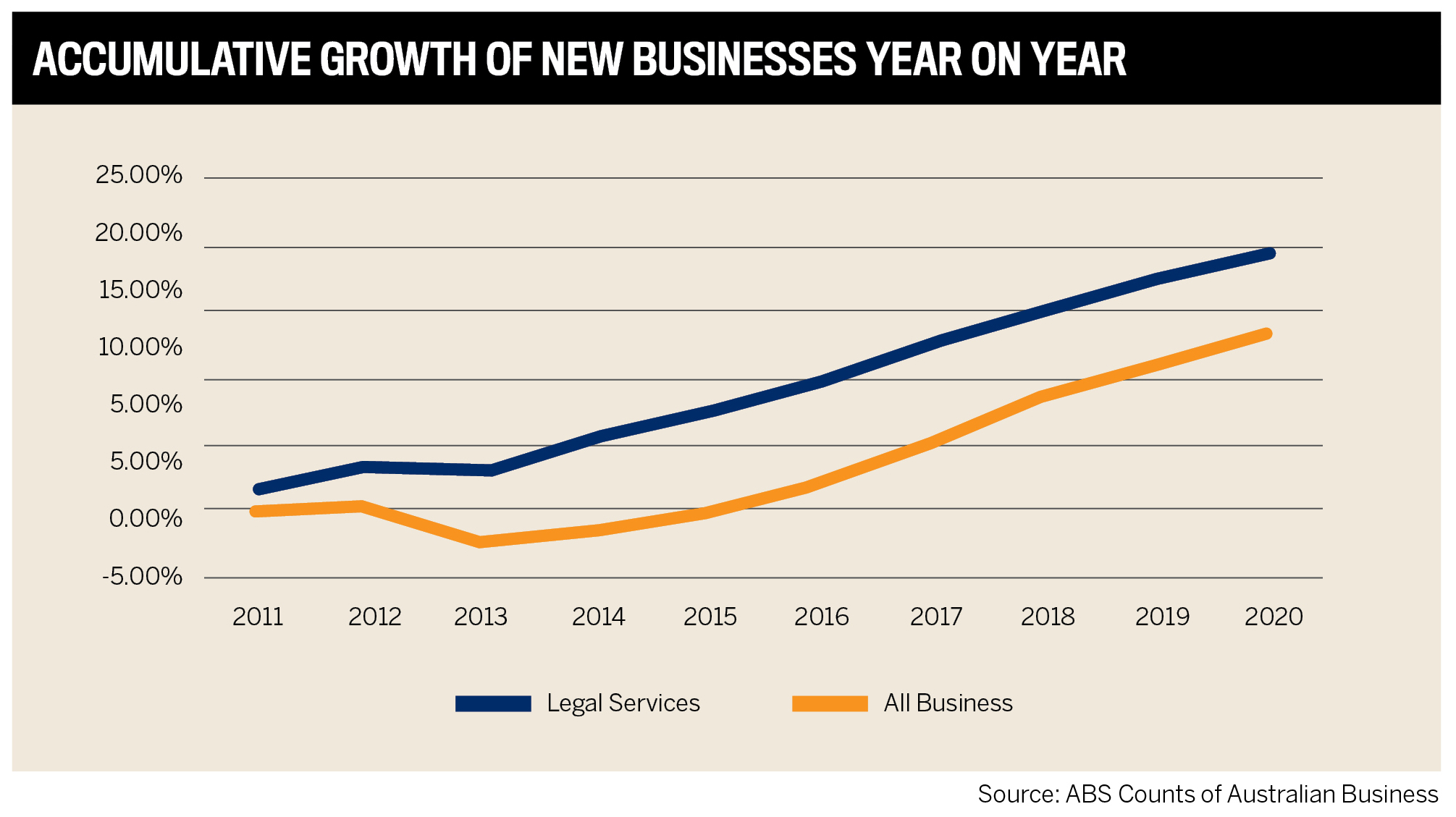
“A well-rounded approach is highly appealing to candidates,” explains Kruger. “Candidates look for opportunities with good mentoring opportunities at all levels, with clear pathways for progression and development being highly valued. All these aspects are the key decision-makers for a candidate accepting an offer from an employer.”
One of the oldest and largest independent law firms in Australia, Maddocks’ history and reputation are key ingredients for its continued success.
The firm, which has over 700 employees split across offices in Canberra, Melbourne and Sydney, will celebrate its 140th year of operation in 2025. Its mission is to make a difference for clients, the communities in which it operates and its people.
Known for its collaborative approach and high service standards, the firm consistently works on significant matters and is accessible, transparent and responsive to clients’ commercial needs.
Maddocks’ culture is built on five core values:
integrity
collaboration
commitment to doing things better
respect for the individual and diversity
stewardship

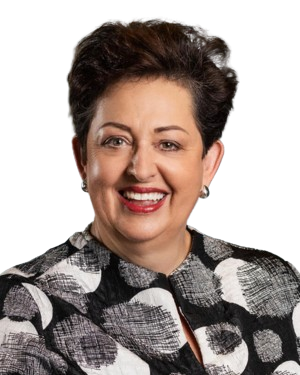
Employees are empowered to develop and progress their careers.
“Culture speaks to where you make your investments,” says director of people and culture Deborah Stonley. “We make our investments in having good career programs for learning and development for our employees at every stage of their career.”
An initiative to drive this is the two-year intensive Partner Ready Program for high potential senior associates and special counsel.
“For our new partner appointments between the years 2018 and 2023, 68% were internal, and 32% were lateral recruits, which really demonstrates our focus on organic growth and our strong emphasis on developing our people,” adds Stonley.
In 2022, Maddocks undertook a firm-wide strategic review of their remuneration scheme. It showed the firm’s gender pay gap is at the lower end of the scale in the Australian legal sector, at 8.1% (as of February 2024, according to the Workplace Gender Equality Agency).
“We work with the partnership to improve how they communicate salary review outcomes,” says Stonley. “This approach improved transparency and strengthened our people’s understanding of how we determine remuneration outcomes.”
Gilchrist Connell, one of the leading insurance sector law firms, operates across all jurisdictions with its mantra, “Listen, Engage, Solve,” setting it apart.
The firm’s values are:
enjoyment: fulfilling work, friendly atmosphere and importance of work-life balance
freshness: innovation, effective approaches, flexibility and agility
quality: reliability and consistency, achieving potential and commitment to excellence
respect: for colleagues and clients
trust: acting with integrity, open communication and treating everyone fairly
unity: working together as one across geographies, teams and levels


“Our firm is known for its positive culture and commitment to developing its people,” says chief people officer Belinda Cohen. “In searching for talent, cultural fit is a critical priority, followed by relevant experience and skills. We also take a long-range view and consider a candidate’s professional goals in both the immediate and longer term.”
Gilchrist Connell offers competitive remuneration referenced against industry benchmarks.
Cohen says, “Our philosophy is that anything we offer must be meaningful and impactful for our people, particularly given we are competing with firms that are larger, have been around longer and have bigger budgets. Additional benefits, such as extra leave and travel, are offered as forms of reward in addition to our discretionary bonus scheme, which all employees are eligible for.”
5-Star firm Blackwood Family Lawyers values its staff and fosters a collaborative and fun working environment, equipping employees with the tools to perform. The firm’s progressive environment has helped the business grow since being founded in 2013, but its values have remained steadfast.
“We are incredibly close as a team,” says practice manager May Hanna. “We don’t have that competitive streak internally amongst our staff that you find at a lot of law firms, but particularly between our lawyers, there really isn’t any of that.”
Hanna credits their robust culture to the firm’s open-door policy, as there is no hierarchical structure.
“The interesting thing about the firm is the relationship and the working style, as legal assistants and lawyers work closely together to provide excellent service to our clients,” she adds. “The legal assistants are super involved in matters.”
In the hiring process, the firm covets people to match its in-house culture.
“We want somebody who is down to earth, humble, a team player who works hard, and who is going to support and nurture the team and those around them,” Hanna says. “We don’t want any toxicity in our firm. It’s important for us to hire good people who hold those values and are collaborative, respectful and honest.”


Blackwood rewards its employees by:
reviewing pay annually
issuing additional benefits if lawyers exceed their budget and for administrative staff who perform well
celebrating excellent client service with team lunches and events throughout the year
Blackwood also has a recruitment bonus if a staff member introduces a new employee, along with study days for their lawyers undertaking the family law specialist accreditation program.
Hanna says, “We provide ad hoc gifts; if we feel somebody’s been doing great work, we’ll get something personal for them.”
A commercial law firm with offices in Melbourne, Canberra, Sydney, Brisbane and Cairns, Holding Redlich employs more than 400 people, including over 50 partners.
Providing solutions tailored to clients’ needs, underpinned by top legal thinking and expert industry knowledge, the firm serves several sectors, such as:
agribusiness
construction, infrastructure and projects
government
property, planning and development
renewable energy
startups and emerging enterprises
technology, media and telecommunications
Holding Redlich’s culture aims to give every employee the same opportunity to progress while improving them as people.
“We recently held a mental health training program for all of our partners and senior leaders across the firm, as the legal industry as a whole is not particularly well regarded in relation to mental health as a whole,” says national managing partner Troy Lewis. “It’s important that our leaders understand and know how to deal with what is best practice around mental health, both for themselves and for identifying risk factors in other individuals.”
Lewis strives to incorporate an open and transparent culture.
He says, “All we ask for is that there's really good communication between everybody. We’re looking for people to support one another and treat them as adults who really do know what the right thing to do is.”


The firm fosters a fulfilling environment by helping them progress in their careers.
“We want to ensure that we are teachers, particularly in the earlier stages of people’s careers, and that we’re spending the time and investing in them to enable them to grow,” adds Lewis. “One of our partners started with me as a graduate and has come through the firm. Another partner that we made in July 2024 also started as a graduate. That’s something that sets us apart. We’ve gotten many internal promotions to leadership positions and also people who have been here for up to 30 years.”
It can be challenging to provide a competitive remuneration package as the firm classifies itself as a mid-level firm.
“We accept that we’re not necessarily always going to be matching the salary of a top-tier firm, but what we expect in return is different as well, and we have a greater focus on flexibility,” says Lewis. “However, we’re very comfortable with where our remuneration structure sits in the market; it’s rare for it to become a make-or-break issue when we’re looking at recruitment.”
Employees demand a wide range of support from law firms. This is reflected in the data showing that flexible working arrangements have a significant effect on stress levels. Other big issues are client pressure, resources and long working hours.
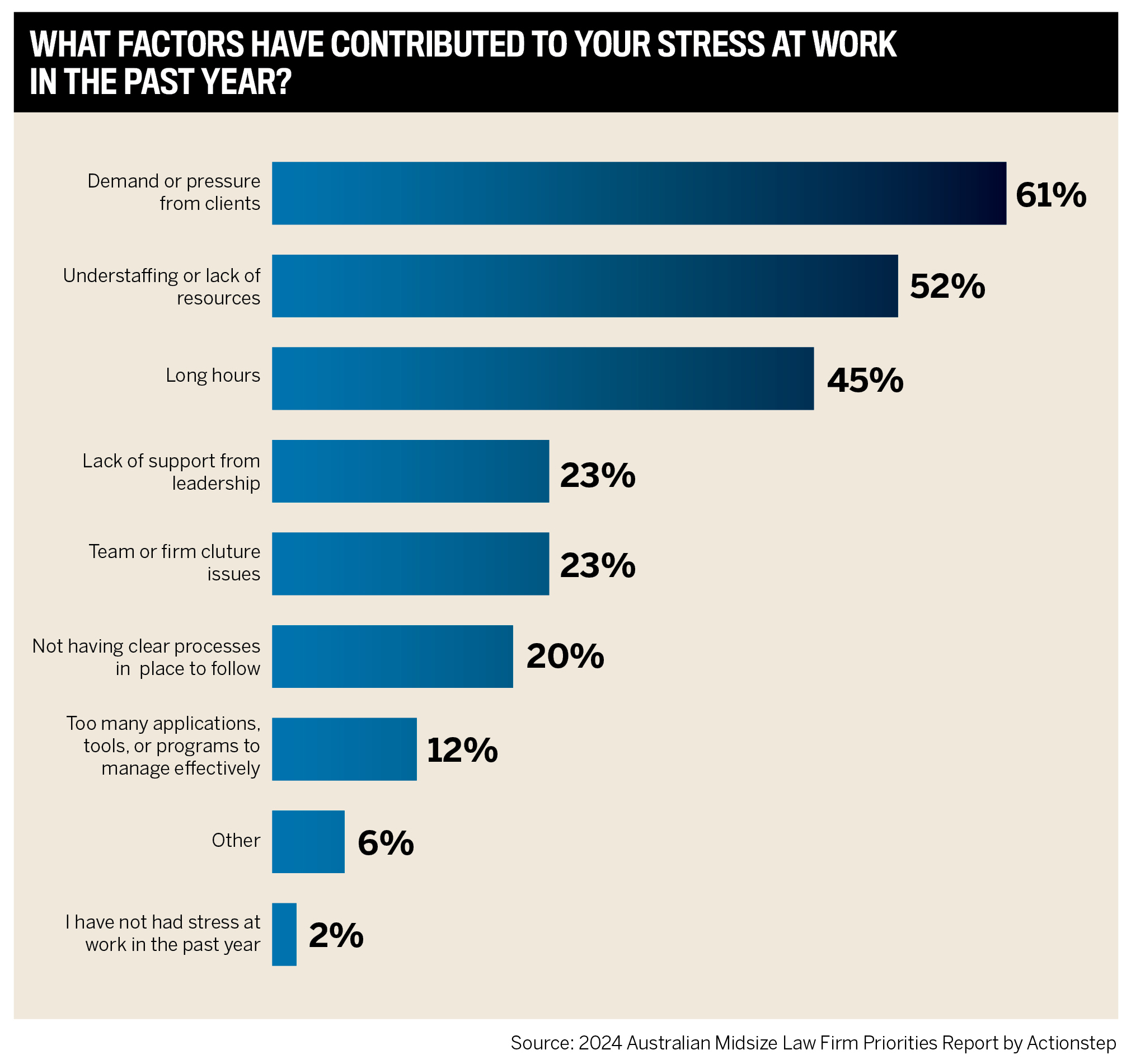
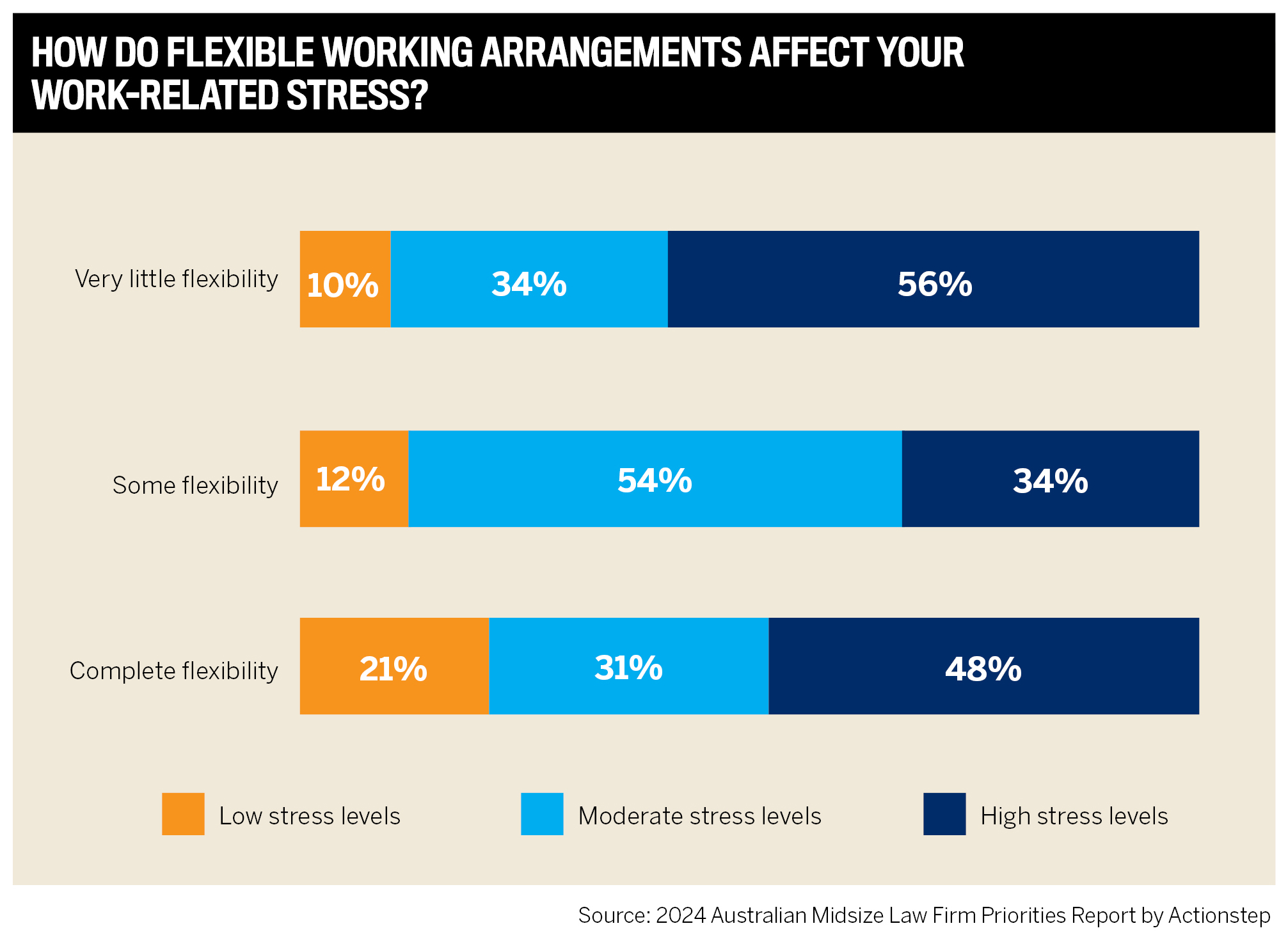
“Many candidates express a strong interest in a competitive parental leave policy; leading firms can offer up to 26 weeks of leave regardless of whether they are the primary or secondary carer,” says Kruger. “This benefit is highly appealing and often plays a significant role in their decision-making process when choosing between multiple job offers. We have observed a growing importance placed on this priority recently and anticipate this trend to continue.”
Blackwood offers a range of benefits to its team, such as:
generous PTO: 20 days plus birthday and a wellness day prior to Melbourne Cup Day
flexible working: two days from home; varies for those coming back from parental leave
employee assistance program: resources such as work-life balance tips
The firm maintains a flexible working arrangement for its employees.
Hanna adds, “We’re proud to offer that to not just our legal staff, but our admin staff too. We don’t make a distinction.”
Gilchrist Connell offers a broad range of benefits, and as a certified family-friendly workplace, it provides:
generous parental and fertility leave
comprehensive EAP offering with TELUS Health, which includes health assessments, vaccination services, online yoga/exercise classes, personal fitness challenges, meditation and an individually customised wellness webinar
leave entitlements: for volunteering, charity giving and blood donations
study assistance programs: professional development through internal and external training, coaching and mentoring
“All services are available not only to our people but also to up to five members of their family,” says Cohen. “Through our partnership with Osara Health, our people can access health coaching for cancer sufferers with online resources developed by oncologists. We have also trained our leaders to be equipped to have conversations with impacted staff in a supportive and useful manner.”
For Maddocks, giving employees the opportunity to improve their mental and physical wellbeing comes first and foremost via HR technology.
Circle in: offering practical tools and resources on parenting and caring
Resilience Box: improving mental and physical health
“For our people who are preparing to have a baby, we also have a subscription with an organisation called Birth Beat, which provides online antenatal classes,” adds Stonley.
Each year, the firm also hosts a wellbeing week that offers a range of sessions for employees to focus on mental, physical and financial health.
Stonley adds, “We have topics such as managing sensitive conversations more effectively, a men’s health panel, parenting teens, managing mental health and healthy habits. You can also do a blood pressure test and receive your result on the spot, which you can then take to your GP if there are any issues.”
The highlight of Holding Redlich’s benefits offering is its flexible working schedule.
“We always joke that we were doing it long before it was cool, trendy or even necessary anyway,” explains Lewis. “We allow every individual practice group to come up with an approach to work that best suits them, their clients and the individuals within their team.”
“Employers must demonstrate empathy towards the individual needs of candidates throughout the recruitment process and be flexible to ensure their comfort,” says Kruger. “Establishing a committee dedicated to DE&I processes and conducting training for existing staff is essential to emphasise its utmost importance.”
Blackwood Family Lawyers’ commitment to DE&I is steadfast, as out of its 25 staff:
23 are women
all four principals are women, including two founders
13 out of 15 lawyers are women
“We’re also looking to hold multicultural days in the office, where everybody brings in a meal or shares a little bit about their culture,” says Hanna.
DE&I is embedded in Gilchrist Connell’s culture. The firm’s Inclusion Committee leads and drives initiatives, which are supported by the firm’s leaders, including:
four speciality subcommittees
membership in the Diversity Council of Australia – guides to best practice
engages in activities/education on awareness days
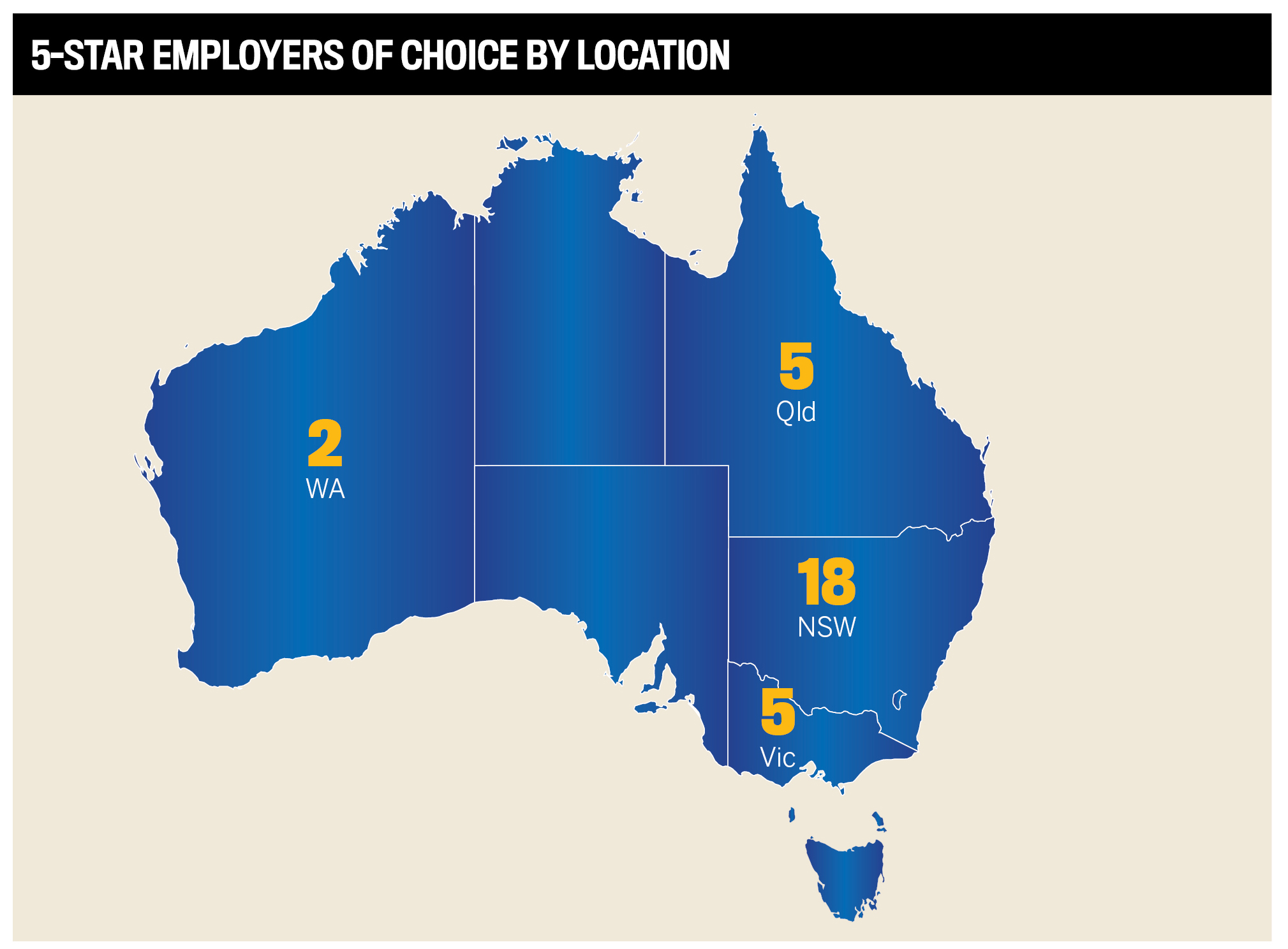
The firm also sets internal targets and benchmarks efforts in two areas:
engagement surveys
policies and practices
Gilchrist Connell was judged to have met the Great Place to work and Best Places to Work Australia benchmark scores (between 96% and 98% across five statements) for delivering a physical and psychologically safe workplace free from sexual harassment and all forms of discrimination.
In April 2024, the firm retained its certification as a Family Friendly Workplace (a joint initiative of Parents at Work and UNICEF Australia), which benchmarks its policies, practices and promotion frameworks.
As a signatory to the Charter for the Advancement of Women in the South Australian Legal Profession, the firm’s commitments to this charter apply nationally, and it has successfully achieved the WGEA Employer of Choice for Gender Equality (EOCGE) citation for 2023-25.
“Female partnership has increased year on year (43-46% for FY23/24), and our flexible work practices support equal participation in the workforce. We are continuing our work towards meeting the requirements of the Law Council’s National Gender Briefing Policy,” says Cohen.
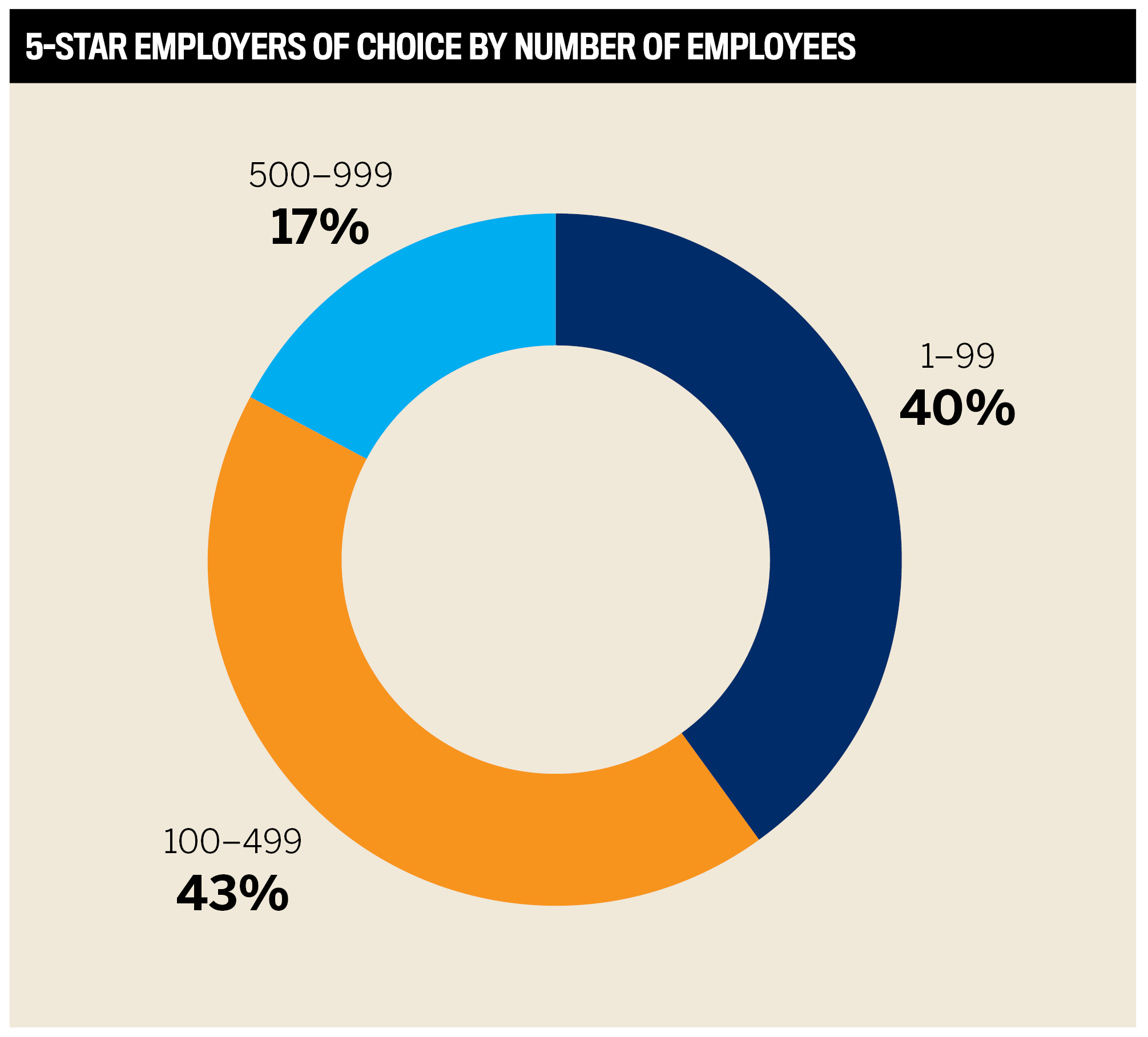
DE&I has been a core strategy at Maddocks for many years. Its focus is on building a culture of inclusion, respect and belonging.
Over the past 12 months, the firm has launched new initiatives:
Disability employee resources group: 11% of staff have or care for someone with a disability
Cultural leave policy: allows staff to take time off that might not be deemed a national holiday
Reconciliation Action Plan
Hear My Name: software for employees to embed an audio recording of the pronunciation of their name in email signature
When we did our recent engagement survey, 83% of people said they have a sense of belonging at Maddocks,” says Stonley. “The real change has been in inclusion, with building our leadership programs around inclusive leadership and educating people across the firm about why that is so important.”
DE&I is a central value for Holding Redlich, as it empowers and creates opportunities for every individual.
“We have a national inclusion and diversity committee whose job it is to ensure that we’re always right at the forefront of anything that is happening around DE&I,” explains Lewis. “We support education across the firm by running courses and seminars. We’re really proud of our strides in lessening the gender pay gap because the industry is bad. It is, on average, 22.9%, and we're at 2.1%. It’s something that is important when we're talking to people in the market.”
In April, Australasian Lawyer opened the nominations to the ninth 5-Star Employers of Choice list, which continues its tradition of spotlighting the law firms that most effectively looked out for their staff through employee-centred programs over the past 12 months.
The research team highlighted the following as key factors in positive employee experiences: remuneration, training and professional development, career progression, diversity and inclusion, access to technology and resources, communication, leadership, work-life balance, health and wellbeing, reward and recognition, and recruitment. Firms were asked to list the initiatives they had in place as well as their achievements in these key areas.
The AL research team reviewed the entries, which consisted of both quantitative and qualitative information, to determine their performance as leading workplaces. A total of 30 firms were identified as 5-Star Employers of Choice.